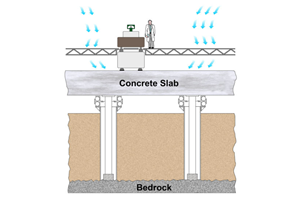Schools And Industry—A Winning Combination
"What can I do?" is a common question asked by representatives from member companies of the Precision Metalforming Association (PMA) and other metalworking trade associations when they are trying to determine how to successfully work with their local schools to improve the pool and basic skills of potential employees. Member companies have heard the litany that "all education is local" time and again.
Share




"What can I do?" is a common question asked by representatives from member companies of the Precision Metalforming Association (PMA) and other metalworking trade associations when they are trying to determine how to successfully work with their local schools to improve the pool and basic skills of potential employees.
Member companies have heard the litany that "all education is local" time and again. But what does this mean? It means change and improvement will only occur on a local level with local involvement. The metalworking industry often does not know how to assist the education community, and the education community often doesn't know how to work with industry.
In reality this discussion encompasses two distinct groups. The most obvious is the high school population. The second group, young adults and incumbent workers, is sometimes overlooked but nonetheless significant. Let's review some ideas and examples of industry involvement with education. In a typical school-based learning environment there are three types of industry/education interaction that can make a student's experience more meaningful. These are career awareness activities, career exploration activities and career preparation activities.
Many schools begin formal career awareness activities in the sixth grade with career talks. These talks are short presentations by industry representatives to a class describing the industry, its work environment and career opportunities. Web sites, videos, company brochures and pictures are great resources to supplement these talks. At the high school level, career fairs and career days are common. These are special events usually organized by the school to bring employers, parents and students together. Career day activities are designed to help students assess their interests and abilities regarding potential careers. Career days also give students and parents the opportunity to discover potential careers and provide a source of information about these careers. Manufacturing is often under-represented at these events. Metalworking companies should participate at every opportunity and should invite themselves if necessary! Your trade association undoubtedly has materials (like PMA's Student Ambassador Program) and tips to assist you. You also supplement these activities with workplace tours. Invite students, teachers and parents to visit your facility, observe operations and talk to employees.
At the next level are career exploration activities. Job shadowing for anywhere from a half day to 2 weeks allows a student to get a feel for a typical day in the industry. A student accompanies an employee doing his or her normal work. Job rotation allows students to shadow several employees in different positions that require different skills and responsibilities. This gives the student an overall understanding of the steps required to produce a product.
Career preparation activities tend to be more hands-on, making them appropriate for older students. Internships allow students to work a regular job for a specified time to learn about the industry in general and specific jobs in particular. Students' workplace activities may include special projects, samples of various tasks or a single job. In some cases, but not all, students are compensated for their work. Cooperative education programs have been around for many years. Students coordinate their high school or postsecondary studies with a job in a field related to their occupational objectives and receive course credit.
Finally, there are the well-known apprenticeships and youth apprenticeships. These programs combine school-based and work-based instruction, approved by the state or federal Bureau of Apprenticeship and Training. The employer and employee agree to a formal relationship. Under the terms of that relationship, the employee learns an occupation in a structured setting. Traditional apprenticeships are designed for individuals who have completed high school. Youth apprenticeships are designed to give high school seniors, who meet special requirements, the opportunity to get an early start in a traditional apprenticeship.
The key to this discussion is that industry can and must play a role in school-based programs that can yield more and higher quality employees. There are many opportunities available for involvement; companies should select those that they are comfortable with, can sustain and that will provide the best results.
Related Content
4 Commonly Misapplied CNC Features
Misapplication of these important CNC features will result in wasted time, wasted or duplicated effort and/or wasted material.
Read MoreHow to Calibrate Gages and Certify Calibration Programs
Tips for establishing and maintaining a regular gage calibration program.
Read More4 Rules for Running a Successful Machine Shop
Take time to optimize your shop’s structure to effectively meet demand while causing the least amount of stress in the shop.
Read MoreHow to Mitigate Risk in Your Manufacturing Process or Design
Use a Failure Mode and Effect Analysis (FMEA) form as a proactive way to evaluate a manufacturing process or design.
Read MoreRead Next
Setting Up the Building Blocks for a Digital Factory
Woodward Inc. spent over a year developing an API to connect machines to its digital factory. Caron Engineering’s MiConnect has cut most of this process while also granting the shop greater access to machine information.
Read MoreRegistration Now Open for the Precision Machining Technology Show (PMTS) 2025
The precision machining industry’s premier event returns to Cleveland, OH, April 1-3.
Read More5 Rules of Thumb for Buying CNC Machine Tools
Use these tips to carefully plan your machine tool purchases and to avoid regretting your decision later.
Read More































